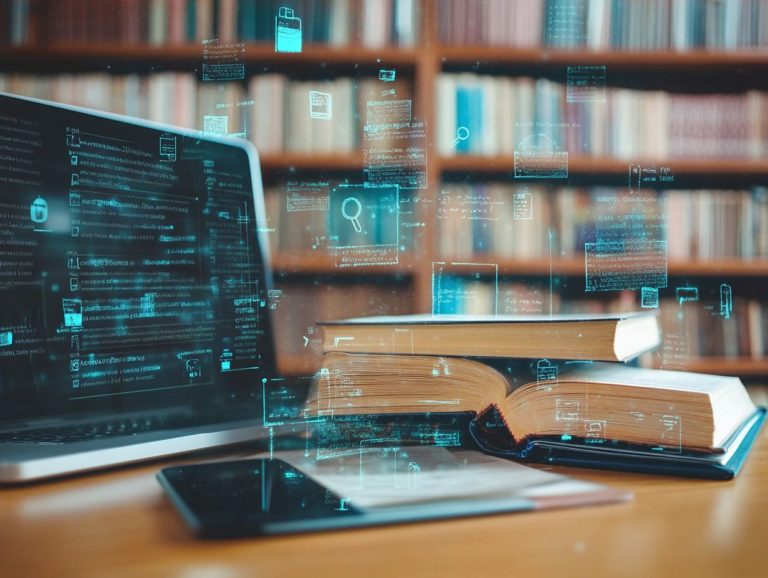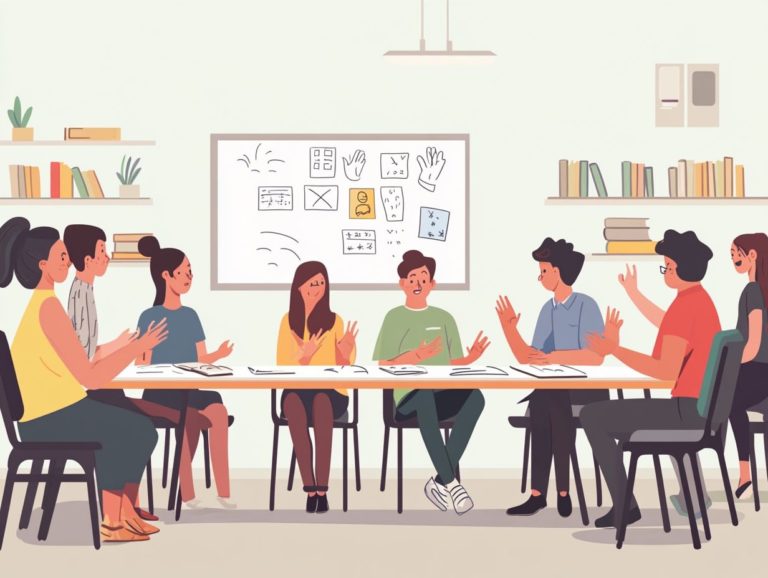how to develop listening skills for language learning
Listening skills are frequently underestimated in language learning. However, they are essential for truly grasping and communicating effectively.
This article delves into the importance of refining these skills, the typical obstacles learners encounter, and practical strategies for enhancing your listening abilities.
You ll discover a range of approaches, from active listening techniques to utilizing media resources, all designed to seamlessly incorporate listening practice into your study routine.
We will also discuss how to measure your progress, ensuring you remain aligned on your language journey.
Contents
- Key Takeaways:
- The Importance of Listening Skills in Language Learning
- Barriers to Developing Listening Skills
- Strategies for Improving Listening Skills
- Incorporating Listening Practice into Language Learning
- Measuring Progress in Listening Skills
- Frequently Asked Questions
- What are some strategies for improving listening skills in language learning?
- How can I become a more active listener in language learning?
- Why is it important to develop listening skills in language learning?
- What are some common mistakes to avoid when developing listening skills?
- Can I improve my listening skills on my own?
- How long does it take to see improvement in listening skills?
Key Takeaways:
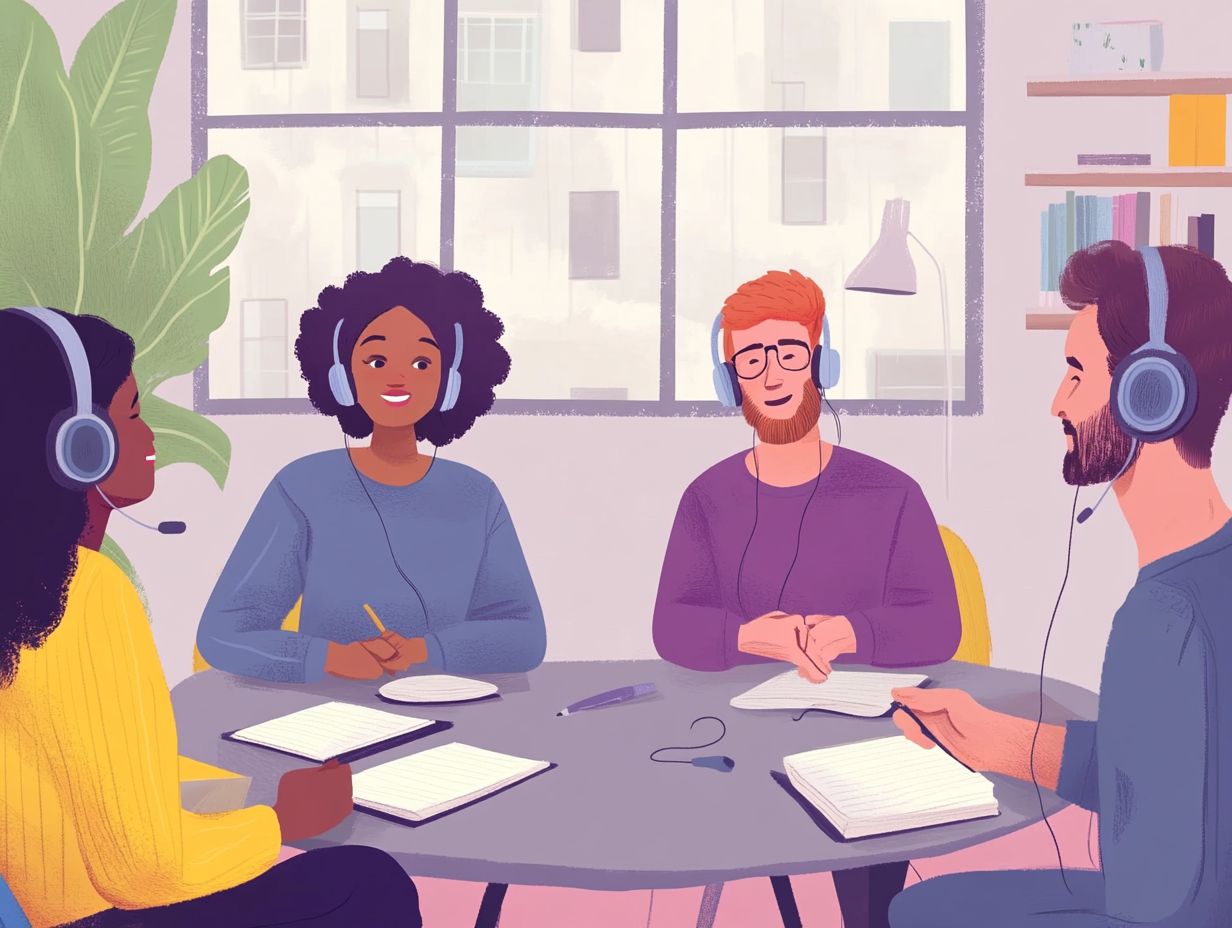
Active listening is crucial for language learning as it improves understanding and pronunciation.
Barriers to developing listening skills include distractions and lack of motivation.
Incorporating listening practice into study plans and utilizing media and resources are effective strategies for improvement.
The Importance of Listening Skills in Language Learning
Listening skills are essential for mastering a foreign language. They boost your understanding, enhance your conversational abilities, and increase your cultural awareness.
By honing these skills, you can achieve your language goals whether it s engaging in meaningful conversations with native speakers, grasping audio materials with ease, or fully immersing yourself in a new linguistic environment.
Incorporate both active and passive listening techniques to elevate your understanding and deepen your overall journey in language acquisition.
Why Listening Skills Matter
Listening skills are vital in your language learning journey. They serve as the foundation for effective communication and comprehension in a foreign language.
When you can accurately interpret spoken language, it enriches your vocabulary and helps you grasp subtle differences, accents, and everyday phrases that frequently appear in conversations.
Active listening is crucial here; it requires you to fully engage with the speaker, fostering a deeper understanding and encouraging more meaningful interactions.
By immersing yourself in the language through diverse media like podcasts, movies, or real conversations you further enhance your understanding.
This dynamic interplay of active engagement and immersive experiences cultivates well-rounded linguistic proficiency, enabling you to navigate conversations with both confidence and clarity.
Barriers to Developing Listening Skills
Developing listening skills is essential for mastering a language, as highlighted in the importance of listening in language learning. However, several barriers can stand in your way.
Unfamiliar audio pacing, insufficient exposure to authentic materials, and ineffective listening strategies can all impede your progress.
Don’t let these challenges hold you back! They can block your understanding and slow your progress.
Common Challenges and Obstacles
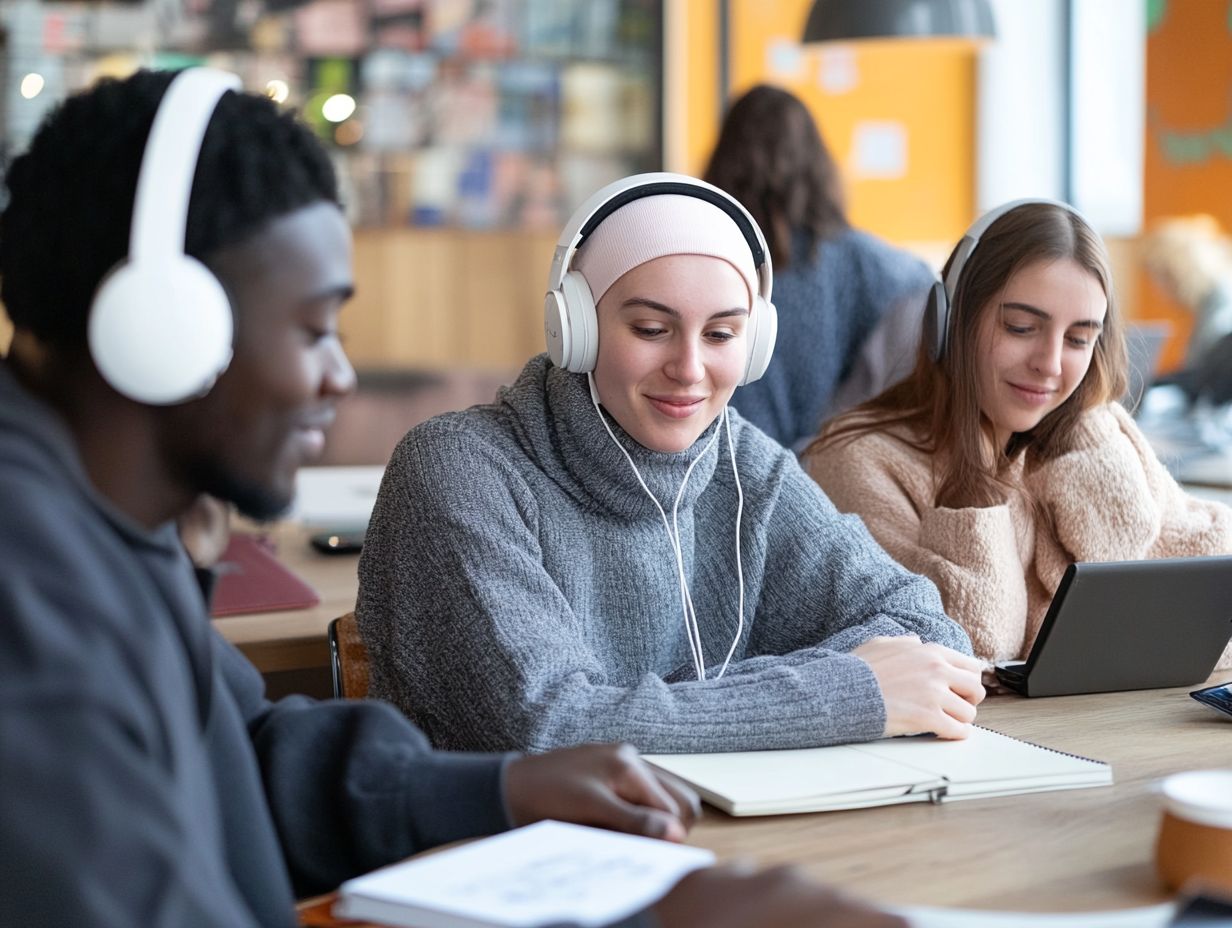
Common challenges in developing your listening skills often stem from a reliance on passive listening. This habit can impede your active engagement and hinder your effective understanding.
You may find yourself absorbing audio material without fully processing it, which leads to a shallow understanding and poor retention.
Limited exposure to diverse audio resources compounds these difficulties, as you might hear the same repetitive phrases or familiar intonations that don’t equip you for real-world conversations.
This lack of variety stifles your ability to grasp different accents and colloquialisms, making it harder to adapt to various speaking styles.
As a result, these obstacles contribute to a significant gap in your overall language skills, particularly when it comes to understanding nuanced meanings and responding appropriately in dynamic interactions.
Strategies for Improving Listening Skills
Enhancing your listening skills involves a rich tapestry of strategies that weave together active listening techniques, a variety of audio resources, and comprehension exercises customized to your specific language goals.
By integrating visual aids alongside your listening practice, you can significantly boost both your understanding and retention of spoken language.
Active Listening Techniques
Active listening techniques are essential for mastering communication in a foreign language. They allow you to immerse yourself in conversation practice. This significantly enhances your listening comprehension.
By employing strategies like summarizing, you can reflect on what you’ve understood. This ensures clarity and forges a stronger connection with the speaker.
Asking questions shows your interest and drives deeper dialogue. It paves the way for better understanding.
When you respond thoughtfully to comments, you validate the speaker’s feelings. This creates a supportive atmosphere conducive to language learning.
These techniques elevate your conversational skills and sharpen your comprehension. They enable you to process information more effectively as you navigate the intricacies of a new language.
Using Media and Resources
Utilizing various media and resources is essential for developing your listening skills. This exposure helps you experience authentic language use and diverse accents through audio materials like podcasts and TV shows.
Engaging with podcasts covering a wide array of topics immerses you in the nuances of conversational speech. You will encounter phrases commonly used by native speakers and cultural references.
Language exchange platforms offer opportunities to interact with native speakers. This provides real-time feedback and a chance to practice active listening.
These methods reinforce your language comprehension and enhance retention through dictation exercises. They challenge you to concentrate and accurately capture spoken language.
Such dynamic approaches make every session both educational and enjoyable. Ultimately, they foster greater confidence and proficiency in your listening abilities.
Incorporating Listening Practice into Language Learning
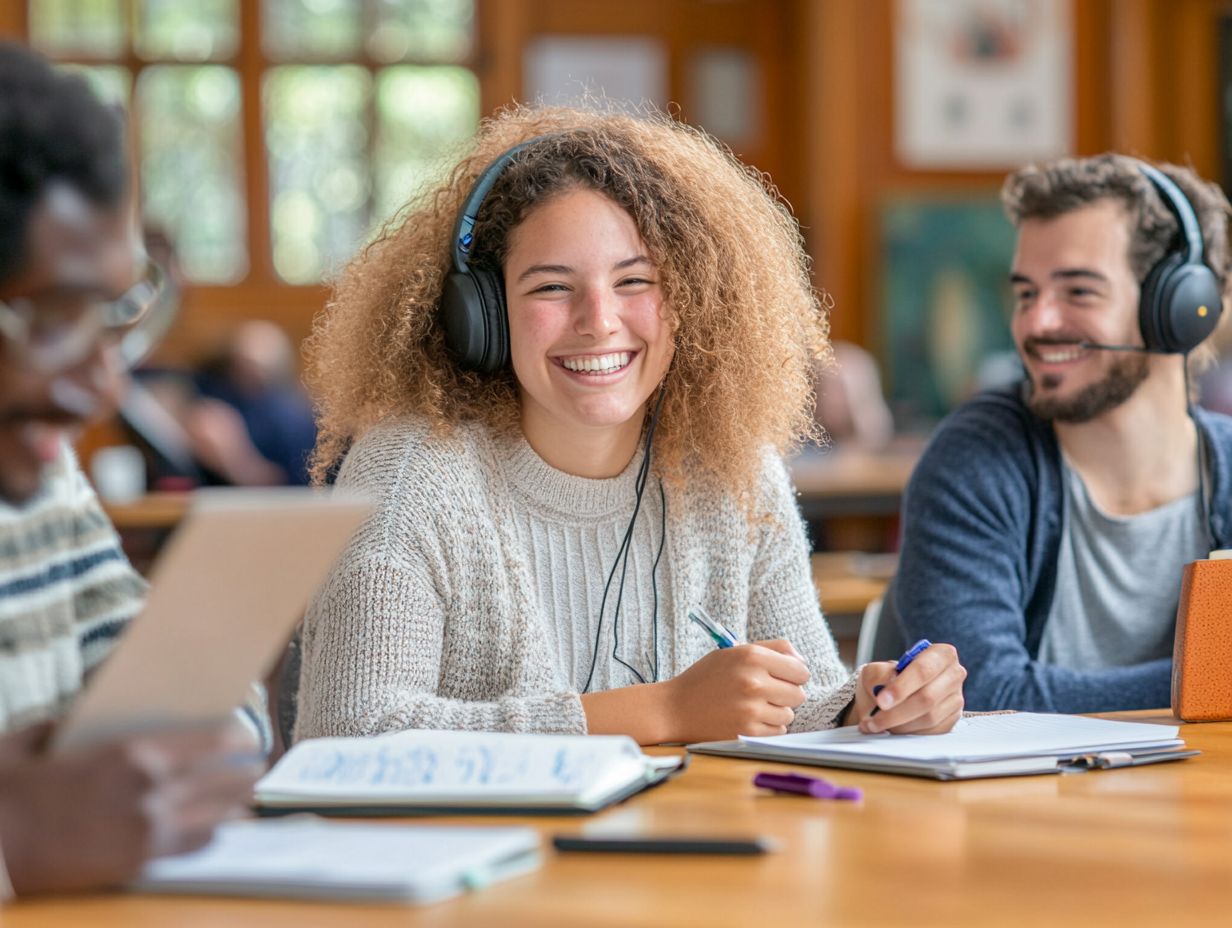
Make listening practice a key part of your language journey! It’s crucial for honing your fluency and comprehension skills.
By consistently exposing yourself to auditory material, you enhance your engagement with the language. This cultivates genuine listening experiences.
Regular practice, paired with well-structured listening strategies, equips you to navigate various conversational contexts with confidence and ease.
Ways to Integrate Listening into Study Plans
Integrating listening resources into your study plan is essential for maintaining consistent practice. These resources offer structured opportunities for expanding your vocabulary and improving comprehension.
By actively engaging with audio materials like podcasts, audiobooks, and language-specific videos, you immerse yourself in authentic language use. This helps solidify your understanding and refine your listening skills.
Set aside time each week to dive into listening practice! Employ techniques such as taking notes or summarizing content to reinforce your learning.
Utilizing audio transcripts can further bolster your comprehension and vocabulary acquisition. This provides a valuable tool to revisit complex phrases and unfamiliar words.
This approach ultimately enriches your overall language proficiency, setting you on a path to mastery.
Measuring Progress in Listening Skills
Measuring your progress in listening skills is essential for grasping your development in listening comprehension. This can be effectively accomplished through various assessments and self-evaluation techniques tailored to your personal language goals.
Assessment and Self-Evaluation Methods
Assessment and self-evaluation methods are vital for tracking your listening progress and enhancing your listening comprehension skills over time.
By utilizing a variety of tools such as quizzes, comprehension exercises, and reflective practices, you can significantly elevate this process. Quizzes provide immediate feedback, enabling you to gauge your understanding of spoken content.
Comprehension exercises foster a deeper engagement with the material. Reflective practices encourage critical thinking by prompting you to consider your strengths and areas for improvement.
By regularly incorporating these methods into your routine, you can effectively monitor your listening skills. You will pinpoint specific challenges and make necessary adjustments to your approach, ultimately leading to enhanced proficiency.
Stay committed, and watch your listening skills soar!
Frequently Asked Questions
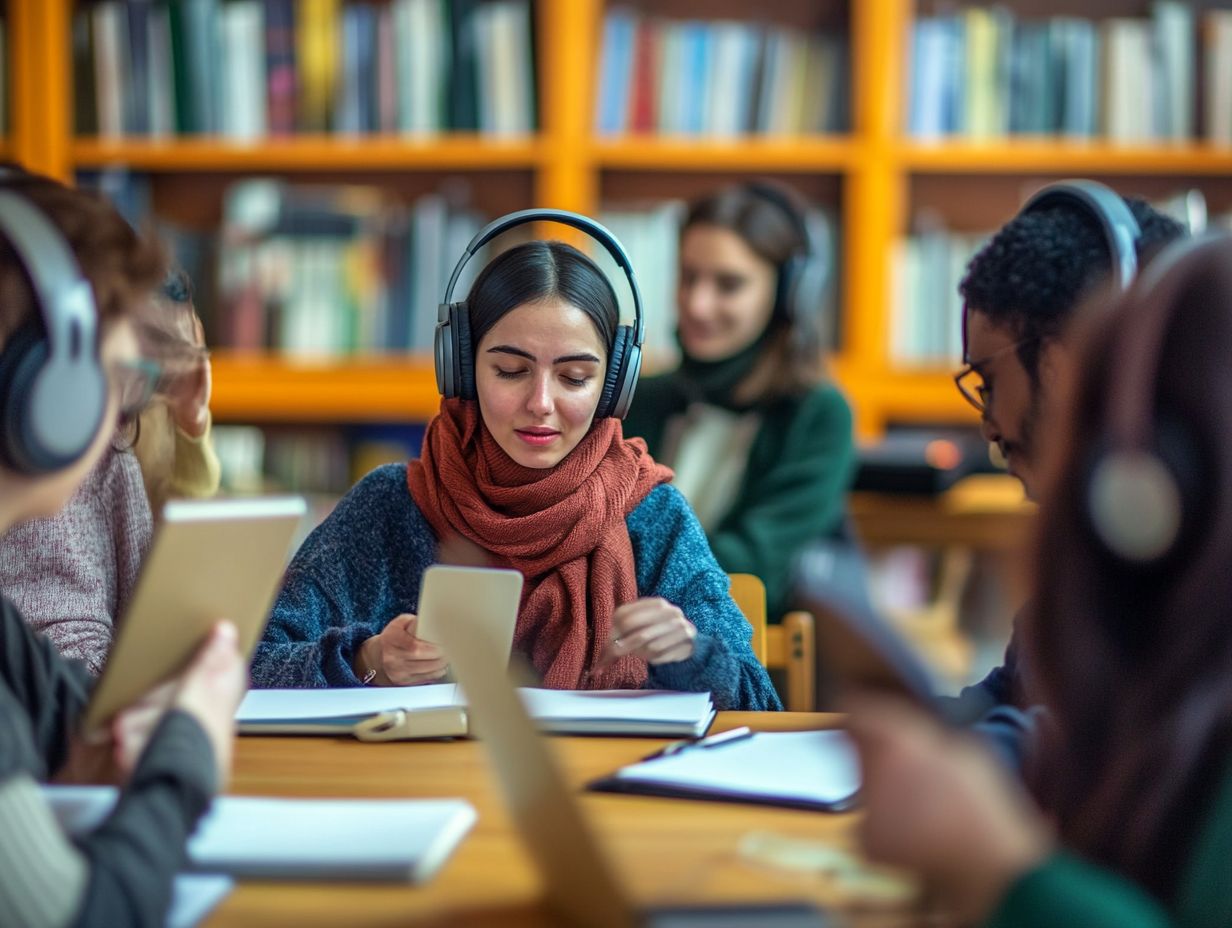
What are some strategies for improving listening skills in language learning?
Improve your listening skills by actively listening to native speakers. Use audio and video resources, practice with a language partner, and focus on key vocabulary and grammar.
How can I become a more active listener in language learning?
To be an active listener, set specific goals for yourself. Take notes and ask questions to clarify your understanding.
Why is it important to develop listening skills in language learning?
Listening skills are crucial because they enhance your overall comprehension and fluency. They also improve communication with native speakers and deepen cultural understanding.
What are some common mistakes to avoid when developing listening skills?
Avoid focusing too much on every word. Don’t listen passively engage with the material and remember to practice regularly.
Can I improve my listening skills on my own?
You can absolutely boost your listening skills on your own! Use resources like podcasts, music, and online videos, and practice taking notes.
How long does it take to see improvement in listening skills?
Improvement time varies for everyone. With consistent practice and effective strategies, you could see noticeable progress in just a few weeks or months!

